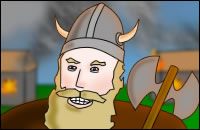Eric Bloodaxe, King of Jorvik (York) and Northumbria (947-954)
Created | Updated Mar 29, 2009

Eric had such a great army that five kings followed him because he was a valiant man and a battle winner. He trusted in himself and his strength so much that he went far up country and everywhere he went with warfare.
- The Fagrskinna Saga
Eric was an awesome character who lived up to his name - brawny, bewhiskered, brave and the proud possessor of a big axe. He was one of the last pagan kings in England, with a violent temperament and a habit of taking what he wanted wherever he found it. His pedigree was good, being the son of the King of western Norway and married to Ozursdottir Gunnhild1, the daughter of the King of Denmark.
Eric fled to England after he failed to seize the Norwegian crown in 935 (he had been slowly improving his chances by taking up the mostly harmless hobby of fratricide). After arriving in England he made such an impression, by raiding in Scotland and such like, that in 947 he was elected King of Northumbria2. Eric held court in the hip and happening city of Jorvik (York). For a short while he resisted Saxon claims to the North with the support of a kindred spirit Wulfstan, Archbishop of Jorvik. However, in 948 the Saxon King Eadred managed to dislodge and expel Eric.
At this point Eric went off adventuring, but he returned to England in 952 and once again took over the North. It took two years for King Eadred to wrest back control of the North. In 954 at the battle of Stainmoor, Eric's son Haeric, his brother Ragnald and Eric himself were killed3, ending the Scandinavian royal tradition in Jorvik for good.
Eric's Name - Traditional Spellings
It should be noted that there are several spellings of Eric's name. The modern version has been used throughout this text, but for completeness sake here are all the spellings you should look for when doing further research on Eric Bloodaxe:
- Eric Bloodaxe
- Eric Blooðaxe
- Erik Blooðaxe
- Eirik Blooðaxe
- Eiríkr blóðøx
The same is true of other people mentioned in this text. For instance, the wife of Eric, Ozursdottir Gunnhild, could have her name spelled as Ozursðottir Gunnhilð, his son Haeric could have his name spelled Hæric and Ragnald, his brother, could also be spelled Ragnalð.

